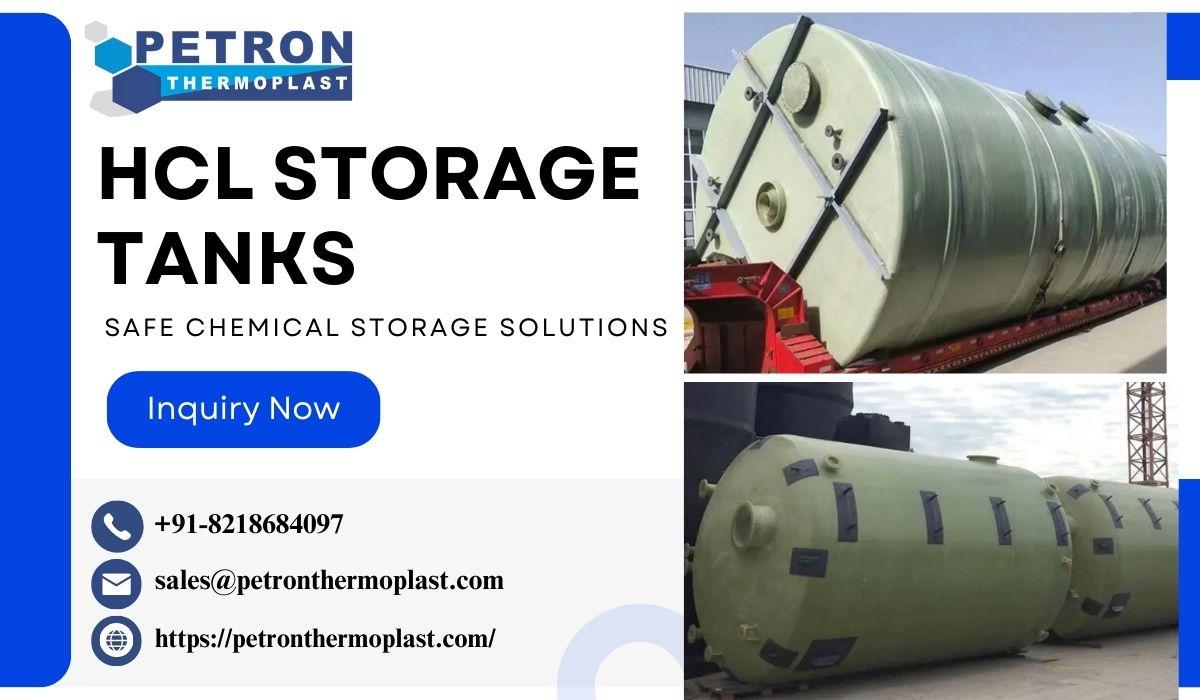HCL Storage Tanks – Safe Chemical Storage Solutions

Hydrochloric acid (HCL) is one of the most widely used chemicals across various industries, including chemical processing, pharmaceuticals, water treatment, and manufacturing. Due to its highly corrosive and hazardous nature, storing HCL safely is a critical requirement for ensuring workplace safety, protecting the environment, and maintaining compliance with industry regulations. This is where HCL storage tanks play a vital role.
Designed using high-performance, corrosion-resistant materials, HCL storage tanks ensure long-lasting and secure chemical storage. In this blog, we will explore the importance of HCL storage tanks, their key features, technical specifications, benefits, and industrial applications.
Why Safe Storage of HCL is Crucial?
Hydrochloric acid is a strong mineral acid that poses several risks:
- Corrosion: It aggressively corrodes metals and unprotected surfaces.
- Health Hazards: Exposure to fumes can cause respiratory issues, skin burns, and eye irritation.
- Environmental Risks: Improper handling can lead to leaks and contamination.
Product Description – HCL Storage Tanks
HCL storage tanks are specialized chemical tanks designed to safely store hydrochloric acid in various concentrations and volumes. They are typically manufactured using materials like FRP (Fiber Reinforced Plastic), HDPE (High-Density Polyethylene), PP (Polypropylene), or PVC, which are known for their excellent chemical resistance and durability.
These tanks are available in a wide range of sizes, from small-capacity tanks used in laboratories to large industrial tanks with storage capacities of several thousand liters. They are designed in different configurations such as vertical tanks, horizontal tanks, and underground tanks to suit specific industrial requirements.
Key Features of HCL Storage Tanks
- Corrosion Resistance: Built from non-metallic materials like FRP, HDPE, or PP that resist acid attack.
- Leak-Proof Design: Seamless construction ensures no leakage, even under continuous chemical exposure.
- Durability: Long service life due to high structural strength and chemical resistance.
- UV Resistance: Tanks are UV stabilized, allowing safe outdoor installation.
- Customizable Capacity: Available in a variety of sizes to meet industrial storage needs.
- Low Maintenance: Minimal upkeep required compared to metal tanks.
- Safety Compliance: Manufactured as per industry standards for safe chemical storage.
Technical Information of HCL Storage Tanks
| Specification | Details |
| Material of Construction | FRP, HDPE, PP, PVC (depending on application) |
| Storage Capacity | From 500 liters to 50,000 liters (custom options available) |
| Design Types | Vertical tanks, horizontal tanks, cylindrical tanks, underground tanks |
| Wall Thickness | Designed as per storage capacity and chemical concentration |
| Temperature Range | -20°C to +80°C (varies by material) |
| Concentration Tolerance | Suitable for HCL concentrations up to 37% |
| Lining Options | FRP lining, dual laminate lining for extra protection |
| Installation | Available for both above-ground and underground setups |
| Standards | Manufactured as per ASTM / DIN / ISO guidelines for chemical storage tanks |
Benefits of Using HCL Storage Tanks
- Maximum Safety
These tanks minimize risks of chemical leakage, ensuring safe storage and handling. - Long-Term Durability
Built from corrosion-resistant materials, they offer a long operational life without frequent replacement. - Cost-Effective Solution
Compared to metal tanks that corrode quickly, HCL storage tanks reduce long-term maintenance and replacement costs. - Environmental Protection
Leak-proof construction prevents soil or groundwater contamination, supporting eco-friendly practices. - Versatile Design
Available in multiple shapes and sizes, making them adaptable for small to large industrial setups.
Industrial Applications of HCL Storage Tanks
HCL storage tanks are widely used across multiple sectors, including:
- Chemical Processing Industries: For bulk storage of hydrochloric acid used in chemical reactions.
- Water Treatment Plants: For storing HCL used in pH adjustment and scale removal.
- Pharmaceutical Industry: For acid storage during drug manufacturing processes.
- Textile Industry: For bleaching and dyeing processes requiring hydrochloric acid.
- Metal Treatment and Electroplating: For pickling operations and surface treatment of metals.
- Food & Beverage Industry: In regulated amounts for certain processing applications.
Types of HCL Storage Tanks
Depending on industrial needs, the following types of HCL storage tanks are commonly used:
- FRP HCL Storage Tanks – Lightweight, durable, and corrosion-resistant, ideal for large industrial applications.
- HDPE HCL Storage Tanks – Cost-effective, chemical-resistant tanks suitable for medium-scale industries.
- PP HCL Storage Tanks – Highly resistant to acids and alkalis, offering excellent thermal stability.
- PVC HCL Storage Tanks – Suitable for moderate storage needs with good acid resistance.
Factors to Consider Before Choosing an HCL Storage Tank
When selecting the right HCL storage tank, industries must consider:
- Capacity Requirements – Based on daily/annual usage.
- Material Compatibility – Ensuring the tank material suits the concentration of HCL.
- Space Availability – Whether to opt for vertical, horizontal, or underground installation.
- Safety Standards – Compliance with industry regulations.
- Maintenance Needs – Selecting a tank that requires minimal upkeep.
Safety Considerations in HCL Storage
- Always install venting systems to handle acid fumes safely.
- Use secondary containment systems to control accidental leaks.
- Ensure regular inspections to detect wear and tear.
- Train workers in safe handling practices for HCL storage and transfer.
Why Choose High-Quality HCL Storage Tanks?
Investing in high-quality HCL storage tanks ensures not just compliance with safety standards but also protects employees, equipment, and the environment. A premium-grade tank offers long service life, reduced downtime, and consistent performance, making it an essential asset for any industry dealing with hydrochloric acid.
Conclusion
HCL storage tanks are indispensable for industries that require the safe storage of hydrochloric acid. With their corrosion-resistant design, durability, and ability to meet stringent safety standards, these tanks provide the perfect solution for reliable chemical storage. From small-scale laboratories to large industrial plants, choosing the right HCL storage tank guarantees safety, compliance, and efficiency in operations.
If your industry needs a safe and long-lasting solution for hydrochloric acid storage, investing in high-quality HCL storage tanks manufacturer like Petron Thermoplast is the right choice.

